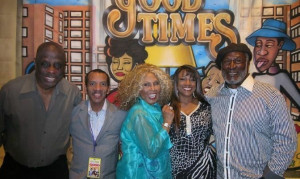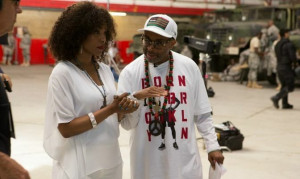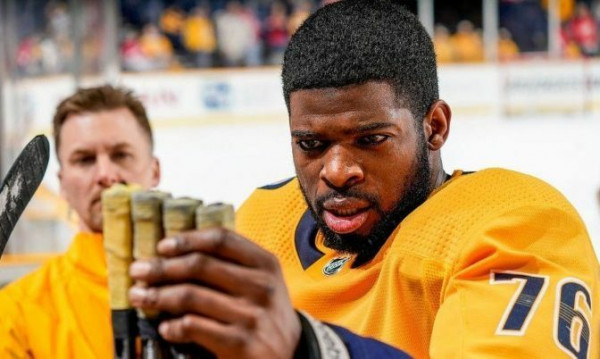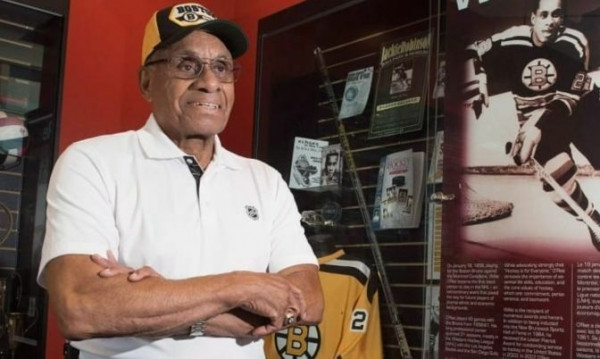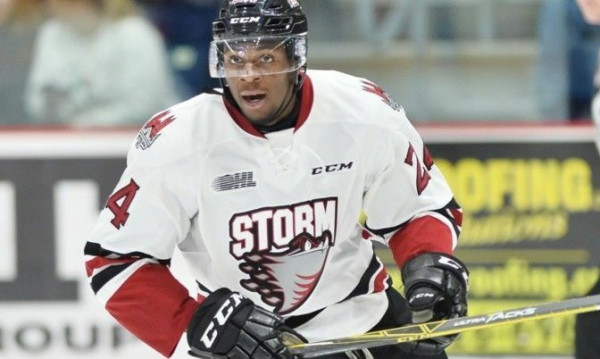Kwame: “And what did you say?”
Jaden: “I don’t know. I’m just a hockey player that happens to be Black.”
The sentiments of Jaden Lindo, a young Black hockey player who dreams of making it big in the NHL embody the message of Kwame Mason’s documentary, Soul on Ice: Past, Present and Future, of hockey players who happen to be Black. This fact has gone untold or, more importantly unacknowledged for decades. Soul on Ice tells hockey’s Black history, masterfully. The story arc is powerful with Jaden Lindo representing the future of Black hockey. Dispelling the myth that skating rinks aren’t found in the hood and Black kids playing hockey is an anomaly drives the storytelling of the film. In North America, Black kids play hockey, Black families watch hockey and Black athletes helped to build this game.
Tell us more about your personal relationship with hockey.
Growing up in Toronto all the young boys, you get outside and play hockey with your friends. Hockey cards. Watch hockey night in Canada. My brother played hockey first on a team and then I played. I didn’t really understand the game. I didn’t have anyone to teach me the game. So we stuck with what we knew which was soccer. But, I had a love for the game that I didn’t really soak up until after Junior high. Hockey was a White boy sport. None of my friends played the game and so for me it became a kind of guilty pleasure.
How did you make the transition from guilty pleasure to documentary?
I moved to Edmonton to work at a radio station and I would go to Edmonton Oilers games. One of the questions that I found myself asking was, how come there still aren’t a lot of Black athletes in the game? We had Wayne Simmonds and P.K. Subban but there had to be more to it than that. So, I started doing some research. I found out about the Colored Hockey League in Nova Scotia. That’s the one that made me think I need to do something about this subject. I grew up here in Canada, in Toronto. How come I didn’t know about this? How come no one is talking about this subject? When I finally was making a transition out of radio, I always wanted to do film and here was the perfect opportunity. Blacks in hockey would be my first topic.
You interviewed so many Black hockey greats- Herbert Carnegie, Georges Laraque, Val James, Willie O’Ree. How long had you been working on this film?
The process for this film wasn’t an easy one. I have never done a film before. I was basically learning from scratch. Financially, I didn’t have a budget. I sold my condo in Edmonton, moved back to Toronto. I basically botowed equipment, time and knowledge. I went out bit by bit and got these interviews. Breaking in wasn’t easy because some people were sceptical about the film, about the message behind it. My first interview was with Herbert Carnegie. Interviewing Georges Laraque opened some doors for me and that helped a couple more NHL guys to give me a shot. I have been working on this for three years and in that time people gravitated towards the film. It built its own momentum. Some athletes were harder to interview than others, like P.K. Subban. Scheduling just never came together but a part of the point was to show people that the road was paved for guys like P. K. I am hoping all Black hockey players get to see this film and see our contribution to the game’s history. We helped make hockey what it is.
Fan girling for a second, what was it like meeting all these Black hockey legends? I for one am very jealous.
It was great. I am a huge fan of the game. To sit and talk to guys who are in it and have been in it was a real treat. The ultimate gift is to be able to do stuff that you love. I love filming and interviewing. To be able to do it on a subject that is close to my heart was a blessing. Meeting Willie O’Ree the first Black Hockey player in the NHL was a truly special moment for me. But bigger than that was going out there and seeing Black and Hispanic kids learning to play hockey - that’s powerful. We take it for granted that kids just play. To see them in love with the game, you see what the future could be.
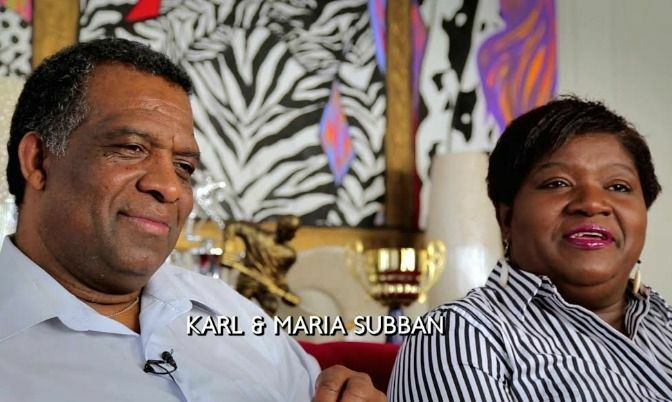
Were the athletes and other people you interviewed excited or hesitant to talk about racism in the game?
Some were fine with it. Overall, they didn’t mind doing the interviews. Some were hesitant because I think some people don’t want to talk about that. When you say you’re going a documentary on Blacks in hockey people automatically think you are going to do something very controversial and that was never my intention. So, I understood the hesitancy at the beginning. When I talked about the film, they were more than happy to lend their voice. The film isn’t about controversy. It is meant to inspire and educate. I want minority families to pick up the game of hockey with open minds and hearts. There will be problems but you can’t allow them to be a distraction and that’s discussed a lot in the film. If you love the game, dig deep and play the game. There are so many opportunities in hockey. It may take you to college or university for free. There are other opportunities in the world of hockey, to coach, to have an impact in other ways and be a role model. Become a referee. There are only two Black referees in the history of Hockey. Yet, hundreds of thousands of Black kids have played hockey.
Early in the film Jaden Lindo’s dad talks about signing his son up to play hockey. A game he obviously didn’t understand. He said, “After getting everything Jaden needed, we only had enough money to get home and that was it. It was what he wanted so it was what we did.” Why was the strong focus on the role of the family for young Black athletes so important to you?
Hockey is truly one of those games where it takes a village. It’s not like basketball where you can send your kid out to play all day. Hockey is a game, you have to book ice time. You have to invest in a lot of equipment. You need a great support from your family. They have to be your first teammates. If your family is not there, it is hard to advance in the sport of hockey. How much family support you have determines how far in the game you get. So, I felt it was important to show people strong Black families represented in a game that we haven’t been in the past. I wanted people to see that we are no different.
What is the role of the Black community, if any, in creating safe spaces for Black athletes in White sports? We don’t seem to make heroes out of the trailblazers in sports like hockey, the same way we do those playing sports we are more familiar with (soccer, basketball, baseball). Why do you think that is?
I think that’s a great observation. I think there is a laziness in that. Basketball, baseball and football; these sports have cemented their fans. Hockey has an audience out there that Black media hasn’t touched. Hockey needs to reach out to minority communities which it has begun doing. Minority communities know that hockey is out there. Every media outlet should know that there are some great Black athletes playing right now. Why wouldn’t you want to talk about something unique instead of the same old same old? We need to come out of our little box. We lived to see a Black US President. A loved Black President- look at what we have seen. There is a stigma we have a put against ourselves. If Black media shined a spotlight you would get more people interested. If BET, Black magazines or Black radio stations talked about these guys, if Sway in the morning had P.K Subban on his show, people are going to say I want to know about these guys or I can play hockey too. If we don’t expose people to it, we will never know. Look there are Black people playing hockey and we are pretty good. I want people to say let me go and check this game out because I saw this documentary or I heard this on the radio.
The arc of the documentary gives me the impression it isn’t finished. Is the documentary finished?
No. I haven’t looked at the females in hockey. I never got to focus on Angela James and her contributions to the women’s game. So I want to go back and do something on the women. Even with Herb Carnegie, his other contributions beyond the ice. These are so important. Black athlete contributions to the structure of the game, we touched on that but there is so much more. There are so many stories out there that need to be told. The film has great momentum right now and is developing interest and I want to continue that. I hope this will result in the ‘powers that be’ backing the film.
What are your goals for the film?
I want to be able to put the film in the reach of anyone that wants to learn something new about the game. I want to reach as many places as I possibly can. It would be great if a philanthropist, donor or funder could come on board and help us take the film to the next stage. The film is now available on the National Hockey Network in the US. And I am doing a free screening at the University of Toronto on March 10th at 7pm at the Goldring Centre for High Performance sport.
Soul on Ice is a powerful film that highlights the resiliency of Black athletes. It also reminds us that our history is multifaceted and still being discovered. In a time when we wish the Black slave narrative would stop being told, we must seek out and support those other Black history stories. Soul on Ice is a great place to start.
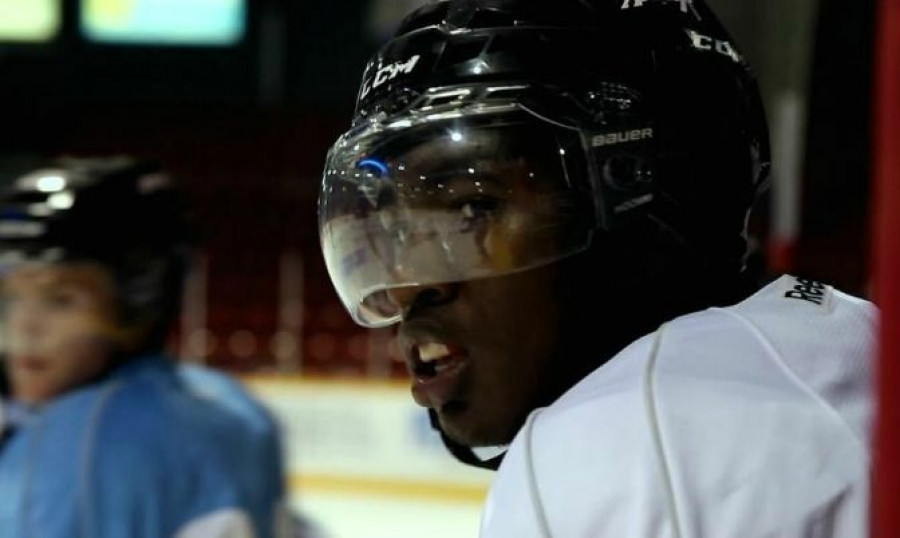
 By
By 




